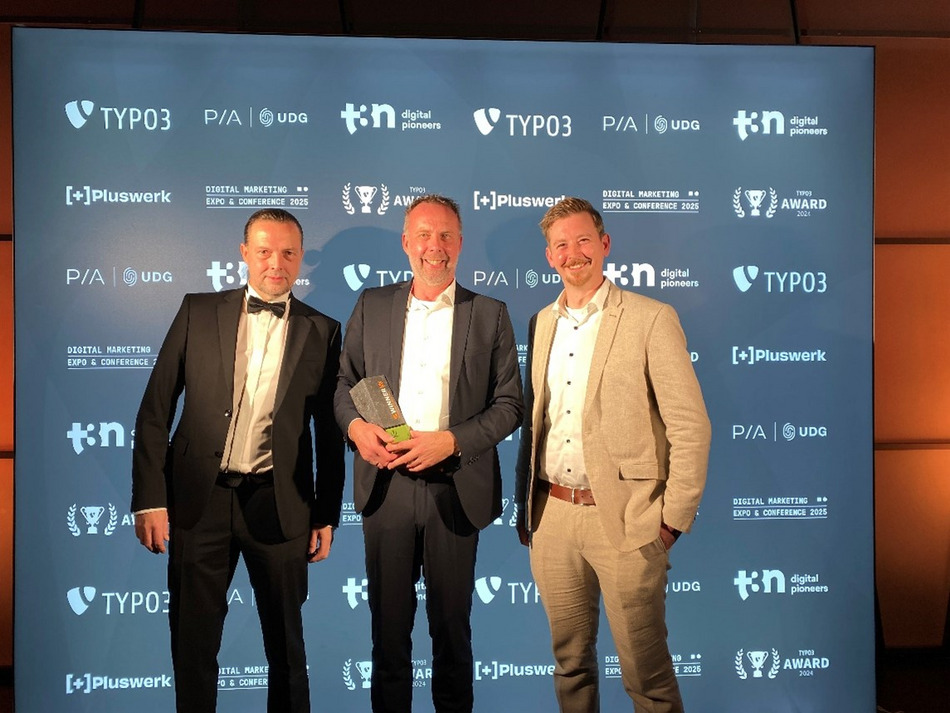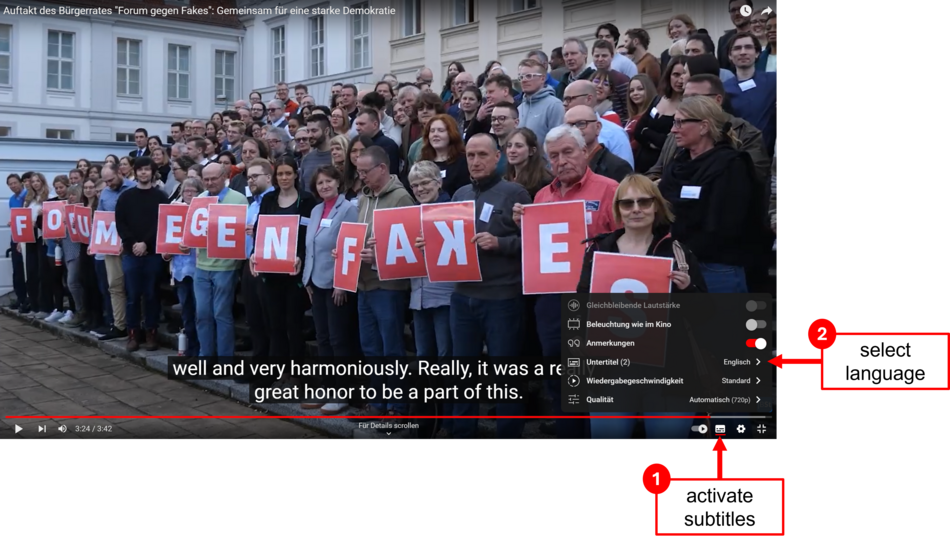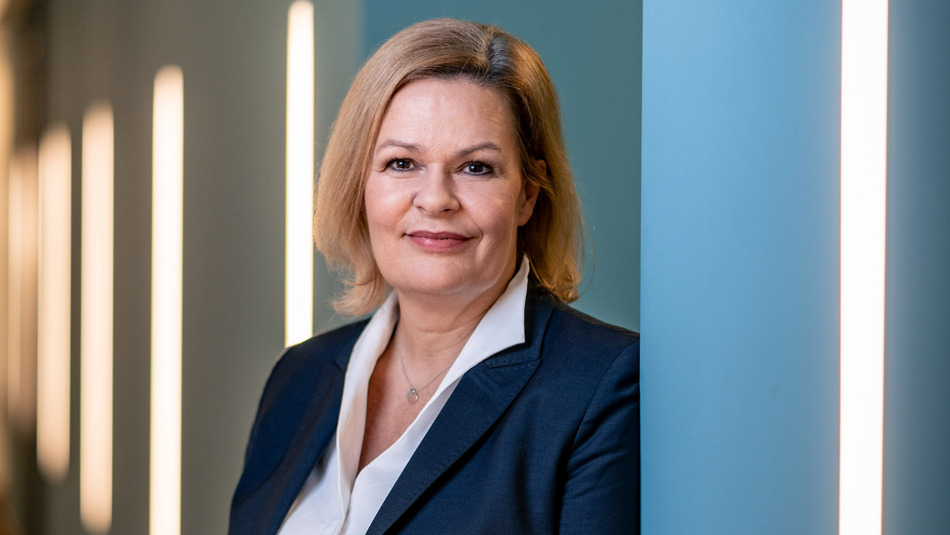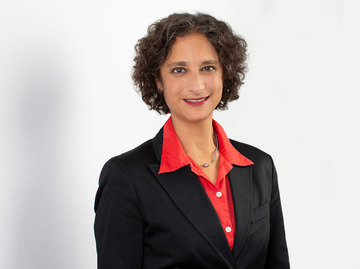Forum against Fakes
About the project
Digital innovations such as high-speed internet, artificial intelligence, smartphones and social media have dramatically changed the speed, intensity and nature of public communication. These innovations have many positive effects, but they also facilitate the spread of what is known as disinformation. This manipulated or false information makes many people feel uncertain and puts pressure on our democracy.
Disinformation is content, which is manipulated and deliberately disseminated. It is extremely challenging not only for Germany, but for many other countries as well. Today, new technologies and software programs make it very easy to spread fake images, videos and spoken words. Deliberately false or misleading assertions can be spread in the blink of an eye and are often shared without questioning their authenticity. This can lead to a feeling of insecurity and a loss of trust within society. In this way, disinformation can also become a threat to democracy.
Citizens' report on how to deal with disinformation
The report can be downloaded here.
News and Events

How it works: The combination of a citizens' assembly with three-stage online participation. Grafik zum shortcut "Citizen participation as a public debate. The 'Forum against Fakes' project", veröffentlicht im Dezember 2024.
Bertelsmann Stiftung
The 12th edition of the shortcut series presents the project “Forum against Fakes - Together for a strong democracy” and how the interaction of the two formats of broad online participation in combination with a diverse citizens' assembly worked. Discover how the “Forum against Fakes” project has strengthened a lively public debate and citizen participation!
The shortcut series presents and discusses interesting approaches, methods and projects for solving democratic challenges in a concise and clear format. The project New Democracy of the Bertelsmann Stiftung publishes it at irregular intervals.
The complete issue of the shortcut can be found here.

We are happy to share some great news: The Bertelsmann Stiftung, together with the implementation partners ressourcenmangel and TAU Berlin, has won the prestigious TYPO3 Award 2024 in the NGO & Non-Profits category for the “Forum against Fakes” website!
Double Honors: Nomination in two categories
Our website was not only nominated in the NGO & Non-Profits category, but also in the Government & Public Sector category, which honors websites for government agencies and the public sector.
Why this award is so special
The Jury of the TYPO3 Awards consisting of leading experts from the digital industry, evaluated the websites based on the following criteria:
-
Speed/Performance
-
Design and user experience (UX)
-
SEO performance
-
Accessibility
-
Best practices
-
Freedom from errors / Accuracy
-
Core Web Vitals (SEO-Ranking, User experiences, technical optimization)
A very good example for this digital excellence
The successful implementation of the digital platform is in line with innovative projects such as the “Forum against Fakes”. In this unique format of citizen participation, an impressive 423,992 participants cast a total of 1,509,720 votes and submitted 3,314 proposals. Over one million people were reached through targeted online campaigns.
A joint success
This success is the result of intensive collaboration and innovation by the project team and our partners ressourcenmangel and TAU Berlin. Together, they have shown how digital solutions with a social and ecological focus can be implemented at the highest level.
A complete list of the winners of the TYPO3 Awards can be found here.
Heartfelt congratulations to the entire team for this tremendous success!
On September 12th, 2024, the citizens' assembly presented its recommendations for dealing with disinformation to Federal Minister of the Interior and Community, Nancy Faeser (SPD). The recommendations contain 28 specific measures and are addressed to politicians, media, educational institutions, economy and civil society.
You can watch a summary of the event as well as the speeches and panel discussion in full length and with English subtitles here - enjoy!
Summary of the event https://www.youtube.com/watch?v=ZXCDqpQi6lM&t=27s
Speeches and panel discussion (full length) https://www.youtube.com/watch?v=_A-5N8g0KMQ
Instructions regarding how to enable subtitles can be found here.
A Citizens' Assembly is submitting its recommendations on how to deal with disinformation to Federal Minister of the Interior Nancy Faeser (SPD) today. The recommendations contain 28 concrete measures for action by policymakers, the media, educational institutions, businesses and civil society. Around 424,000 participants were involved.
There has been wide public support for the recommendations of the Citizens’ Panel “Forum against Fakes” on how to deal with disinformation: in the final online participation phase, more than 200,000 citizens cast 623,000 votes on 28 recommendation proposals of the Citizens’ Panel “Forum against Fakes”. The online participants’ rating of the measures was predominantly positive.

The short films offer insights into the citizens' assembly sessions in March and May. English subtitles are available and can be activated in the settings on Youtube. You'll find the settings icon just below the video and can select English or German subtitles under "subtitles" (see above).
In its four sessions, the citizens’ assembly compiled five provisional recommendations for better ways to deal with disinformation, and subsequently invited the general public to submit feedback online. The Bertelsmann Stiftung project presents the results of the online participation in a report. The majority of online participants support the recommendations. 9,623 citizens voted 10,381 times on the citizens’ assembly’s five preliminary recommendations and left a comment 1,703 times in all. There is a broad consensus in favour of the recommendations on better ways to deal with disinformation.
The Bertelsmann Stiftung project “Forum against Fakes: Together for a stron democracy" has sparked a broad debate about dealing with disinformation. In spring, the project invited citizens to take part in its online participation – and about 200,000 people have already contributed to the debate and submitted 1,611 concrete proposals on how to proceed against fake news. Here are the results of the debate.
The big day finally arrived on 15. March: more than 120 people from all over Germany came together to spend a weekend discussing the topic of disinformation and how to deal with it. The atmosphere could not have been better, and to cap it all, the sun was shining brightly when the citizens’ panel “Forum against Fakes” got under way at the Kronprinzenpalais in Berlin. A perfect start!
Since January 2024, more than 165,000 people have contributed to the innovative online participation scheme entitled “Fakes and manipulated information: what should we do to protect our democracy?”. Over 700,000 votes cast and 1,600 proposals submitted demonstrate that citizens regard fakes and manipulated information as a genuine threat to democracy. Citizens have concrete proposals to make – not just for policymakers, but also for internet platforms and social media.
Forum against Fakes – Together for a strong democracy: recent digital innovations mean that is now easy for false information and “fake” images, videos or audio recordings to spread rapidly. . This can lead to insecurity and loss of trust within our society, and ultimately threaten democracy itself. Bertelsmann Stiftung is organising a Germany-wide citizen participation project – the “Forum against Fakes” – to tackle these developments.
Forum against Fakes – Together for a Strong Democracy
The project “Forum against Fakes – Together for a Strong Democracy” was launched to sensitize the public about this development. The aim of the project is to initiate a debate across Germany about how to deal with disinformation, using a unique participatory format. Together with the public, the project explores ways to strengthen democracy and dialogue. That is why the project's central aim is the direct participation of as many people as possible. The aim is to involve the broader public to improve the response to disinformation and to formulate specific policy recommendations for the government.
The project will address the following questions:
- How can we protect freedom of expression and protect ourselves against manipulated information?
- What role do social media and advancements in the field of artificial intelligence play in the context of digital communication?
- How can we strengthen social cohesion?
- How can we prevent interference of foreign governments, e.g. with elections in Germany?
Everyone can participate: individuals can propose ways to deal with disinformation, share their own experiences and comment on the input of others. This open dialogue helps people to be more informed about the issue of disinformation.
In addition to knowledge about disinformation, the project also aims to strengthen individuals' ability to check whether their sources are credible. This is intended to increase their competence to use different media responsibly.
However, countering disinformation is not only an individual task – it is a task for society as a whole. Citizens, policy-makers, public administration, businesses, the media and civil-society actors must take responsibility and can develop measures to efficiently tackle manipulated information and disinformation. A well-informed society, a pluralistic media landscape, high-quality journalism and education policies that strengthen news and media literacy can help us to deal effectively with disinformation. This interaction between all sectors will help make our society more resilient to manipulated information and will strengthen our democracy. The Forum against Fakes aims to examine how this can be achieved.
It’s all about the mix!
In order to involve as many people as possible and to achieve the best possible outcomes, the project “Forum against Fakes – Together for a Strong Democracy” combines two types of public participation:
Firstly, everyone in Germany is invited to take part in broad-based online consultations. During these consultations, anyone can submit comments and opinions on how to deal with disinformation. Secondly, a citizens’ assembly of 120 citizens that reflect the diversity of society discusses the compiled outcomes of the online consultations and addresses the most important issues.
Linking the citizens' assembly and online participation
An innovative format for innovative outcomes
In addition to the online consultation, the citizens’ assembly can discuss questions on the topic with experts. The information gained during this process helps the citizens’ assembly to effectively address relevant topics. As a result, the citizens’ assembly formulates specific recommendations for policy-makers, which are compiled in a citizens' report.
The project Forum against Fakes will run until summer 2024. Overall, the online consultations and the work of the citizens’ assembly will be divided into three phases: in the first phase, the online consultations will collect topics, ideas and suggestions on how to deal with disinformation, which the citizens’ assembly will address in its first meetings. During the second phase, online participants will provide feedback on the ideas of the citizens’ assembly, which will be used to put together concrete recommendations. During the last phase, online participants will be able to vote for the three most important recommendations.
Finally, the citizens’ assembly will present its policy recommendations to the Federal Ministry of the Interior and Community (BMI) and the Bertelsmann Stiftung in September 2024. The report will also be sent to additional ministries, Bundestag committees and policy experts at federal and state level. The policy recommendations included in the report will be used by the BMI to draft a strategy for countering disinformation.
Who is involved in the project?
The project “Forum Against Fakes – Together for a Strong Democracy” is run by the Bertelsmann Stiftung in cooperation with the Federal Ministry of the Interior and Community (BMI), Stiftung Mercator and the Michael Otto Foundation for Sustainability. The main role of the BMI in this project is to receive the policy recommendations compiled during the public participation process, while the Stiftung Mercator and the Michael Otto Foundation for Sustainability are providing funding. In addition, the project is supported by the t-online news portal, the initiatives #UseTheNews and “Deutschland Sicher im Netz e.V.” and the project advisory board.
With the public participation project “Forum against Fakes – Together for a Strong Democracy”, the Bertelsmann Stiftung aims to help make our democracy more inclusive for everyone. The new mass participation format combines broad online consultations with a citizens’ assembly composed of randomly selected members of the public. In order to ensure transparency and an effective implementation of this public participation project, the Bertelsmann Stiftung has established a project advisory board.
This project advisory board advises the Bertelsmann Stiftung on all aspects of the implementation of the public participation project “Forum Against Fakes – Together for a Strong Democracy”. The board is composed of members of the Bertelsmann Stiftung, which manages the project, the BMI, the foundations mentioned above and the organizations supporting the project. The work of the project advisory board is complemented by the know-how of university researchers and experts from civil-society organizations with practical experience.
By advising the Bertelsmann Stiftung, the project advisory board ensures that the processes, content and outcomes of the project are in line with the overall concept and the information continuously gained through scholarly expertise and evaluations. The members of the advisory board provide expertise on issues such as public participation, disinformation and communication; they also provide feedback and ideas. Furthermore, the advisory board recommends disinformation experts for the citizens' assembly, the Bertelsmann Stiftung follows this recommendation.
Why is the Federal Ministry of the Interior and Community (BMI) involved in the project of the Bertelsmann Stiftung?
An important task of the BMI is to defend democracy and strengthen social cohesion. This means taking the threat posed by foreign interference and manipulation in the information space seriously and opposing it resolutely. In order to fulfil its task of strengthening the resilience of government and society, the BMI raises awareness on issues such as the influence of social media on public debates or the role of artificial intelligence in communication in digital media.
Given that disinformation affects society as a whole, it is important to promote a broad public discussion on how to deal with it. This discussion must also be supported by civil-society organizations and foundations. That is why the BMI supports the project of the Bertelsmann Stiftung and cooperates with the other institutions involved.
In this context, the main role of the BMI is to bring the project into the political sphere and to utilize the public’s views and recommendations in its ongoing work on the topic of disinformation. The BMI’s involvement in the project is therefore part of the Federal Government’s proactive, evidence-based and transparent communication in dealing with disinformation.
What is disinformation?
Disinformation is deliberately false information that is spread to manipulate people. It is intentionally used to influence public debate, polarize society and undermine social cohesion and democracy. In contrast, misinformation is false information that is unintentionally spread without the intent to manipulate others. Disinformation, therefore, is neither a mistake, nor an error, nor satire or parody.
Orchestrated disinformation campaigns are particularly problematic. Multiple actors post and disseminate the same piece of false information in a coordinated way. Such campaigns can use technological means to artificially expand their reach and to simulate credibility. For example, newspaper websites may be illegally copied, fake accounts created on social media platforms, and bots used to automatically spread content.
“Disinformation” instead of “fake news”
The term “disinformation” differs from the colloquially used term “fake news”. Although the latter is often equated with false information, it has above all been used by former U.S. President Donald Trump to attack political opponents and “inconvenient” quality journalism. Thus, the term “fake news” has become a polemical slogan.
To account for the complexity of the problem and the different forms in which false or manipulated information is spread, the term “disinformation” has become established in academia, research and politics.
Disinformation as a means to exert targeted influence
It is particularly problematic if false information is used in a targeted and manipulative way to intentionally harm our democracy and the values enshrined in our constitution, the Basic Law. A large number of actors, often from foreign states, use this kind of deliberate deceit to pursue their own agenda. In most cases, their aim is to highlight their own strength, to maintain the support of their own people and to legitimize certain political acts.
For example, foreign states try to undermine our trust in government institutions, the rule of law, elected bodies and the media, thereby polarizing society and threatening to undermine democratic values.

Deliberately spreading false information distorts and poisons the political debate. By taking measures against disinformation we can protect our democracy. For me, it is important that the project “Forum Against Fakes – Together for a Strong Democracy” will invite citizens to engage in a national debate on how to deal with disinformation and to express their expectations of and recommendations for policy-makers. We will use these recommendations to work out a new Federal Government strategy for countering disinformation.
Federal Minister of the Interior and Community
Freedom of expression or harmful behavior?
Our democracy depends on a free and pluralist discourse that does not only allow, but also provide special protection for freedom of speech and expression. In recent decades, the internet has further liberalized this discourse and opened it to more and more people worldwide. Freedom of expression is an essential element of our democracy and guaranteed by the Basic Law. But what happens if it is no longer possible to distinguish between proven facts and manipulated information?
If trust in facts, in the media, in government and its institutions dwindles, social cohesion is at risk. The situation becomes difficult and even dangerous when fact-based information is deliberately manipulated. Manipulated information can harm not only individuals, but also whole groups of people or even entire countries.
Manipulation on the Internet
In many cases disinformation leads to polarization and even to hate and violence. Sometimes it divides whole families. Rifts in our society were noticeable even before the COVID-19 pandemic and the Russian war of aggression against Ukraine. Currently, in connection with the war in the Middle East, manipulated content, false statements, or video footage and images used out of context are causing great uncertainty.
Disinformation and other forms of faked information are becoming a growing danger. Artificial intelligence makes creating fake sound, images and videos comparatively easy. These deepfakes can, for example, make politicians appear to say things that they never said. If foreign states interfere in our public debates with manipulated information, this can lead to political, economic and social instability. Through artificial intelligence and social media, false information spreads like wildfire and can reach – and even mobilize – a very large number of people in a very short time.
Disinformation and faked information - not a new problem
Whereas the speed and the technology with which manipulated information is spread is a modern phenomenon, disinformation itself is not, as history shows. Even the Egyptian pharaoh Ramesses II portrayed a defeat as a victory in order to stay in power. Disinformation is as old as the history of humankind. However, whereas in the past, only a few people controlled which information was spread, today anybody can create and share faked information with the click of a mouse. That is why, today, we have much more deliberately disseminated false information.
Outlook
Procedure: in nine months to concrete policy recommendations through citizen participation
If you have any further questions, please feel free to contact us: kontakt@forum-gegen-fakes.de
Contact

Dr. Angela Jain
Senior Project Manager Bertelsmann Stiftung
kontakt@forum-gegen-fakes.de